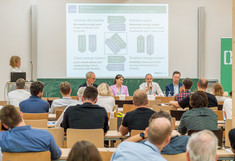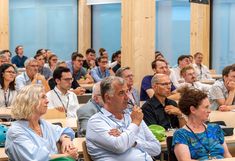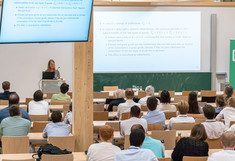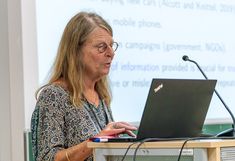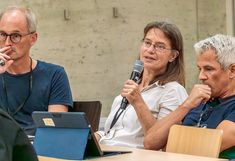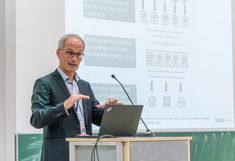NoEG 2-3 September 2024
On September 2 and 3 2024, the Institute of Sustainable Economic Development hosted the annual conference of the National Economic Association (NOeG) on “Transition to a Low Carbon Economy”. Following welcoming remarks by Rector Prof. Eva Schulev-Steindl, around 160 economists discussed how the transition to a low-carbon economy can succeed. A total of around 120 research papers on the conference topic and other economic issues were presented.
Katheline Schubert from the University of Paris Panthéon-Sorbonne and the Paris School of Economics discussed in her contribution “Sobriety. A necessity to fight climate change?” the various options available to our society in the fight against climate change: technological progress, price mechanisms and voluntary changes in behavior. With the help of an economic model and a review of the existing literature on this topic, she showed that voluntary changes in behavior are essential, but will be far from sufficient to stop climate change. Only a mix of all these options can successfully combat climate change. The pricing of CO2 always plays an important role in this.
In his presentation “Changing paradigms - how can electricity market design support reliable affordability and a clean and resilient energy system?”, Karsten Neuhoff from the Technical University of Berlin and the German Institute for Economic Research made suggestions on how the diverse and major challenges of converting the energy system to renewable energies can be overcome. The greatest challenges do not lie in the necessary expansion of photovoltaics and wind energy, but rather in the provision of storage capacities and an economic environment that gives energy producers the necessary security to make the massive but necessary investments. Functioning local energy markets and the possibility of long-term price hedging play a central role in this.
Following the presentation, a high-level panel with Tara Esterl (Austrian Institute of Technology), Karl Gruber (Wien Energie) and Jürgen Schneider (Ministry of Climate Protection) and moderated by Marlene Nowotny (Ö1) discussed the status quo and future prospects for the transformation of the energy sector in Austria. This also revealed the massive legislative, political and economic challenges that need to be overcome.
The “Young Economist Award”, a prize for the best conference contributions by young colleagues, was also presented at the event. These went to Maximilian Boeck (Friedrich-Alexander University Erlangen–Nuremberg), Katharina Drescher (University of Passau) and Sebastian Hager (University of Oxford) for their contributions on belief distortions in financial markets, the positive effects of social workers in schools and the connection between superiors’ gender attitudes and women’s careers, respectively.
The event was sponsored by the Heinrich Graf Hardegg Foundation, Wien Energie and the Austrian National Bank. Further information can be found on the conference homepage. The presentations by Katheline Schubert and Karsten Neuhoff, including the panel discussion, are available online.

